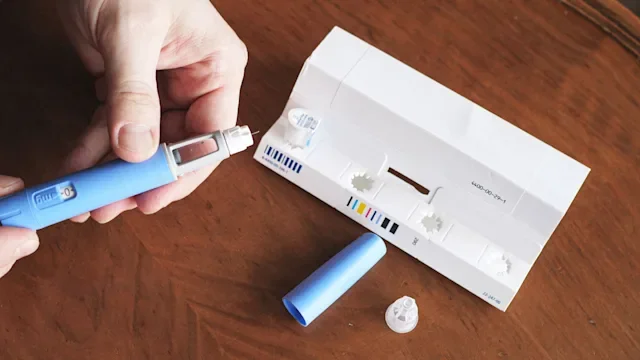Key takeaways:
Semaglutide is a GLP-1 agonist that’s FDA-approved for treating diabetes, metabolic dysfunction-associated steatohepatitis (MASH) with liver scarring, weight management, and reducing the risk of serious heart disease in some people.
The potential benefits of semaglutide don’t stop at these conditions. It may even help people stop smoking.
In a recent study, people taking semaglutide were less likely to seek care for smoking cessation. This might mean that semaglutide helped them smoke less.
Semaglutide is a GLP-1 agonist that’s FDA-approved to treat diabetes, metabolic dysfunction-associated steatohepatitis (MASH) with liver scarring, weight management, and reducing the risk of serious heart disease in some people .
It’s available under the brand names Ozempic and Wegovy. Semaglutide works by helping your body produce more insulin, which can improve blood sugar control in people with diabetes. It also slows stomach emptying, which can help people feel fuller longer. This can help with weight management.
Semaglutide can lower your risk of having a stroke. It can also improve heart and kidney health. There’s even some evidence that taking Ozempic might help you get pregnant.
Search and compare options
Now, there’s hope that semaglutide may help people stop smoking.
Is semaglutide effective for smoking cessation?
It’s not clear if semaglutide is an effective treatment for smoking cessation. But healthcare professionals have noticed that people seem to smoke less once they start taking semaglutide.
A recent article offered insight into the relationship between semaglutide and smoking cessation. Researchers looked at the medical records of over 200,000 people receiving treatment for diabetes. They found that people taking injectable semaglutide (Ozempic or Wegovy) who also smoked were less likely to:
Fill prescriptions for nicotine replacement therapy
Make appointments for smoking cessation counseling
Meanwhile, people taking other diabetes medications sought care for smoking cessation at the same rates. This suggests that those who took semaglutide needed less help to avoid nicotine.
These findings line up with results from another recent study. In this study, researchers looked at nearly 60,000 people taking semaglutide and other medications to manage diabetes. They found that people taking semaglutide reported less nicotine use compared to those taking other medications.
But it’s important to keep in mind that these are observational studies. These types of studies show that there’s a potential link between two things. But they can’t show a cause and effect.
How do you stop smoking? One reader shares his journey and top tips to help you quit smoking.
Nicotine replacement therapy (NRT) can help you stop smoking. Here’s our guide to NRT options that can help you quit smoking for good.
You can use NRT and medication together to help you quit smoking. Here’s how to choose between Wellbutrin and Chantix for smoking cessation.
It’s impossible to determine based on only these studies whether semaglutide is the reason people smoked less. But these studies point out an important connection. Researchers can now investigate this connection with clinical trials, which can show a cause-and-effect relationship.
What does the research say about semaglutide for smoking cessation?
There’s not a lot of research available on whether semaglutide can help people stop smoking. But there’s some animal research in this area. In these studies, rats given oral semaglutide were less likely to seek out nicotine. They also didn’t experience overeating from nicotine withdrawal.
Clinical trials looking at whether semaglutide can help people stop smoking are currently underway. These studies are looking at whether semaglutide can reduce nicotine cravings and help people stop smoking long term. But the results from these studies won’t be available for some time.
Read more like this
Explore these related articles, suggested for readers like you.
In the meantime, research about other GLP-1 agonists can offer some insight. In one small trial, people were given either a weekly dose of exenatide (Byetta), a different injectable GLP-1 agonist, or an injection of sugar water (placebo). They also wore a nicotine patch. After 6 weeks, the group that received exenatide was twice as likely to report that they hadn’t used nicotine. They also reported fewer nicotine cravings.
How does semaglutide help you quit smoking?
It’s not clear how semaglutide helps people quit smoking. It’s likely that semaglutide affects the part of your brain that responds to nicotine. This may make people less interested in nicotine because it removes the “reward response.”
It’s also possible that semaglutide reduces the symptoms of nicotine withdrawal. So, people could be less likely to experience unpleasant feelings when they quit smoking. This could make it easier for people to stick with smoking cessation and avoid relapses.
But it’s not clear if people’s nicotine cravings return if they stop taking semaglutide. It’s also not clear if these effects wear off over time. It’s possible that nicotine cravings might return even if people keep taking semaglutide.
What other options can help with smoking cessation?
Smoking cessation is one of the best things you can do for your health. But it’s not easy to quit smoking. FDA-approved medications, FDA-cleared products, and smoking cessation programs can help. You can use some or all of these options to help you stop smoking.
1. Nicotine replacement therapy (NRT)
Nicotine replacement therapy (NRT) helps you quit smoking by slowly providing your body with less nicotine over time. This helps your body adjust to being nicotine-free and eases uncomfortable side effects from nicotine withdrawal.
NRT is available over the counter in several forms, including skin patches, gum, and lozenges. There are also prescription NRT options, including nicotine sprays and inhalers.
2. Medications
Two medications are FDA-approved to help with smoking cessation:
These are oral medications that are only available by prescription.
3. Other types of support
There are medication-free options that can help you quit smoking. Smoking cessation programs may include support groups and therapy. They can also offer in person, phone, or text support from a mentor. Therapists and others going through smoking cessation can be a wealth of information. They can offer tips for success that you might have a hard time finding anywhere else.
The bottom line
Semaglutide is a GLP-1 agonist that’s FDA-approved to treat diabetes and assist with weight management. There’s research showing that people taking semaglutide seemed more likely to stop smoking. But it’s not clear whether semaglutide can actually help people stop smoking. Clinical trials are underway to determine if semaglutide can be used as a treatment for smoking cessation.
If you or someone you love needs support quitting tobacco, call 1-800-QUIT-NOW (1-800-784-8669) for free coaching, educational materials, referrals to local resources, and more.

Why trust our experts?


References
Centers for Disease Control. (2023). Quit smoking medicines are much safer than smoking.
De Giorgi, R., et al. (2024). 12-month neurological and psychiatric outcomes of semaglutide use for Type 2 diabetes: A propensity-score matched cohort study. eClinicalMedicine.
Herman, R. J., et al. (2023). Liraglutide attenuates nicotine self-administration as well as nicotine seeking and hyperphagia during withdrawal in male and female rats. Psychopharmacology.
Herman, R. J., et al. (2024). Targeting GLP-1 receptors to reduce nicotine use disorder: Preclinical and clinical evidence. Physiology & Behavior.
Rubin, R. (2024). Could GLP-1 receptor agonists like semaglutide treat addiction, alzheimer disease, and other conditions? Journal of the American Medical Association.
Tuesta, L. M., et al. (2017). GLP-1 acts on habenular avoidance circuits to control nicotine intake. Nature Neuroscience.
University of North Carolina, Chapel Hill. (2024). Effects of semaglutide on nicotine intake.
U.S. Food and Drug Administration. (2022). Want to quit smoking? FDA-approved and FDA-cleared cessation products can help.
Wang, W., et al. (2024). Association of semaglutide with tobacco use disorder in patients with Type 2 diabetes: Target trial emulation using real-world data. Annals of Internal Medicine.
Yammine, L., et al. (2021). Exenatide adjunct to nicotine patch facilitates smoking cessation and may reduce post-cessation weight gain: A pilot randomized controlled trial. Nicotine and Tobacco Research.

















